Introduction
Effective marketing delivers the right message to the right audience at the right time and place. For those in the addiction treatment industry, your audience is seeking effective treatment. However, a significant demographic within addiction treatment seekers are millennials with anxiety. Therefore, effective treatment for your target audience is about more than addiction alone.
Millennials are diagnosed with more mental health issues than previous generations, and most of those presenting with substance abuse disorders also suffer from co-occurring mental health issues.
Savvy addiction treatment providers have an opportunity to increase admissions from this demographic simply by refreshing your messaging to address both substance abuse and mental health disorders.
Treatment centers that address both mental health and substance abuse disorders will gain market share and build a thriving business with an extremely loyal client base. Treatment centers should seize the opportunity to start a conversation about multiple treatment options to meet all of their clients’ needs. This messaging approach will also strengthen the position of the treatment center within the client’s mind in terms of their expertise and treatment plans, ease their concerns, and increase admission rates.
Know Your Audience: Why Millennials Have Anxiety
Millennials are changing the landscape of our country and doing so in a way completely unlike any previous generation. They have unique characteristics and attributes that must be considered as part of any marketing strategy.
Spend a minute and get to know more about millennials.

Millennial Childhood
This group was born before “always on” technology and grew into adulthood during a tumultuous time. This experience is having long lasting effects on their mental well-being. Millennials (born 1981 – 1996) were between 12 and 27 during the 2008 election, and voted in record numbers, turning the tide of the election.1 During this same time period, Millennials entered the workforce just as the recession of 2009 hit, which had a significant impact on their long-term spending habits as well as their mental health.1
Impact of Stress
According to a 2015 report on Stress in America, “Millennials are more likely than other generations to say that stress has a very strong or strong impact on their physical (30 percent vs. 27 percent of Gen Xers, 25 percent of Boomers and 12 percent of Matures) and mental health (37 percent vs. 33 percent of Gen Xers, 23 percent of Boomers and 11 percent of Matures).”2
“Always Be Earning” Mentality
Millennials, now age 23 to 38 are either entering adulthood, or well into their primary earning years.3 Most millennials now have the added burdens of children, housing, high pressure jobs, and earning a living in an economy that is difficult at best.4
The 2015 report from the American Psychological Association “Stress in America” indicated similar findings surveyed by the APA.4
75%
of millennials said money was listed as a source of stress.
75%
of millennials said money was listed as a source of stress.
This economic insecurity creates the perceived need by millennials to always be earning. As noted by a 2015 “Millennials and Mental Health” survey by American University,5
“Millennials often feel ‘that they shouldn’t have any time for themselves,’ but should focus instead on constantly building a resume,” according to Maggie Bertram, associate director of training and education at Active Minds, a nonprofit that works with college students to open up conversations around mental health.”
Filling the Income Gap
Many millennials not only have a full-time job but also a “side-hustle” that they develop to fill in income gaps. This doesn’t leave time for leisure pursuits or relaxation.
Even when they do spare time for decompression, they choose solitary and sedentary activities, which are not known to have the same positive effect on mental health as social or physically active past times.4
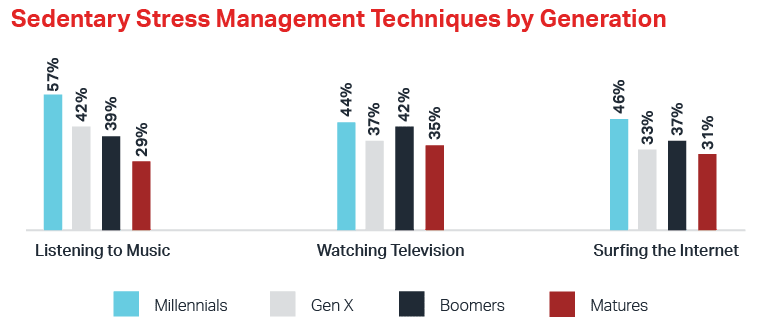
“Millennials appear to rely on more sedentary stress management techniques than other generations, such as listening to music (57 percent vs. 42 percent of Gen Xers, 39 percent of Boomers and 29 percent of Matures), watching television for more than two hours per day (44 percent vs. 37 percent of Gen Xers, 42 percent of Boomers and 35 percent of Matures) and surfing the Internet/going online (46 percent vs. 33 percent of Gen Xers, 37 percent of Boomers and 31 percent of Matures)”.
Millennials Are More Open About Mental Health
Millennials are not the only demographic who are experiencing considerable and unyielding stress, but they are the first group to openly talk about it and seek treatment quicker than previous generations.4
This same generation is also the first to be comfortable talking about mental health issues and seeking treatment options.2 It could be due to the fact so many have mental health issues, or it could just be that they have grown up during the age of the internet, which opened dialogues that were previously kept behind closed doors.
Millennials with anxiety disorder have a
76% increase
in risk for opioid dependence disorder.
Millennials with anxiety disorder have a 76% increasein risk for opioid dependence disorder.
Half of People with Addiction Have Co-Occurring Disorders
Relentless pressure and little payoff create a need for someone to have an escape, or alternatively, they are overwhelmed and need to feel more in control, which leads to mental disorders in the form of anxiety, depression, bipolar and PTSD.7
According to our own 2020 Clinical Interview Study, anxiety disorders, depression, bipolar disorders, and PTSD are the most common co-occurring disorders for those seeking treatment for addiction.
It works the other way as well, a data analysis on the US Opioid Crisis by McKinsey found that Millennials with anxiety disorder have a 76% increase in risk for opioid dependence disorder.8
Millennials with Co-Occurring Disorders Don’t Get Proper Treatment
3.7% of people 18 years of age and older have a co-occurring disorder.8 Of those who have a substance use disorder and a co-occurring disorder, 90% do not receive treatment for the co-occurring disorder.8
This is an untapped market for those practices that treat co-occurring mental illness concurrently with substance abuse disorders.
Millennials Rely on the Internet for Health Information
According to a Trans America Center for Health Studies report on Millennials, they are more likely than older generations (43% vs. 36% of Gen X and 33% of Boomers) to say they rely most on the internet to gather information about their health, health insurance, and the healthcare system. Millennials are almost as likely to rely on family and friends (25%) as physicians, nurses, and other healthcare professionals (27%) for information about their health, health insurance, and healthcare system.9
Meet Millennials Where They Are: Online
With this increase in both need and recognition of the value of treatment, it is more necessary than ever for addiction treatment centers to be able to reach the millennial demographic effectively.
The key to marketing to this group is to meet them where they are and evoke emotion by demonstrating empathy and knowledge of their struggles.
As a digital generation, Millennials have quickly adapted to technology as it has evolved and often lead the way in terms of use.10
Who Owns a Smartphone?
93%
of Millennials (1981-1999)
90%
of Gen Xers (1965-1980)
68%
of Baby Boomers (1946-1964)
40%
of the Silent Generation (1922-1945)
of Millennials (1981-1999)
of Gen Xers (1965-1980)
of Baby Boomers (1946-1964)
of the Silent Generation (1922-1945)
How Millennials Use Technology to Connect
Similarly, 86% of Millennials say they use social media, compared with lighter usage among older generations.10
Almost all Millennials (nearly 100%) now say they use the internet, and 19% of them are smartphone-only internet users – that is, they own a smartphone but do not have broadband internet service at home.10
The best way to target any demographic is to find out where they spend the most time and begin your conversation with them on their chosen communication platform.
It is clear that millennials are online, arguably more than they are offline. Millennials each own an average of 7.7 internet connected devices, and use an average of 3.3 each day.11
Millennials and Social Media
Millennials don’t use social media like any other demographic. Twenty-seven percent of Millennials use Facebook less than once a week, if at all, including 11% who don’t even have an account. In addition, a majority (54%) said they don’t have an account with Snapchat, and roughly four in 10 said they don’t have accounts with Pinterest (41%), Twitter (39%), or Instagram (39%).12
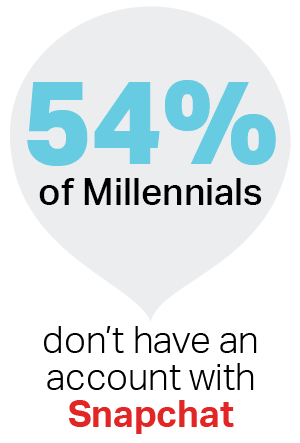
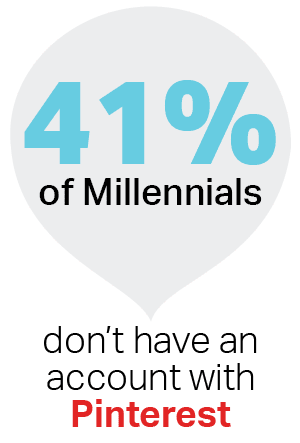
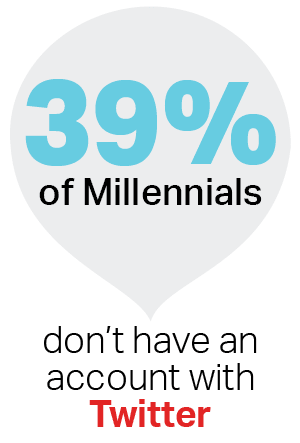
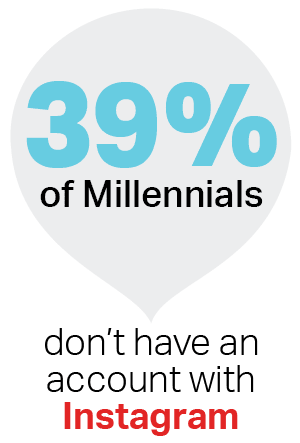
Millennials are Wary of Advertising
Millennials are always online and very adept at dodging ads. As a general rule, millennials are also less trusting of advertising, and they have the option to shut off, block, ignore, skip, or unfollow things they don’t want to hear about.
Millennials are used to being bombarded by advertising and tend to ignore, if not be turned off by the onslaught. Businesses who are targeting this demographic need to be aware of current strategies to break through the noise and get your message heard. What worked 2 years ago won’t work now!



Earn Trust with Content Marketing
When we say content marketing, we mean creating, publishing, and promoting valuable content that can earn the attention and trust of your target audience.
High quality content marketing puts the customer and their experience at the center of your story. For millennials with substance abuse disorders and anxiety, part of their struggle is finding a place that will treat their co-occurring disorders. Authentic messaging that addresses the anxiety of your target audience will resonate with them and compel them to reach out to you.
Active Marketing: Proven Game Changers
Active Marketing has transformed addiction treatment businesses with our strategic horsepower. We have proven experience developing and executing marketing strategies that get your brand’s best messaging in front of the right people at the right time and place. Our impact on our clients’ bottom lines changes the way they do business. We’d love to talk to you more about your potential.
Give us a call today: (877) 947-2605
Resources
- https://www.pewresearch.org/fact-tank/2019/01/17/where-millennials-end-and-generation-z-begins/
- https://www.apa.org/news/press/releases/stress/2014/stress-report.pdf
- https://www.nami.org/Blogs/NAMI-Blog/February-2019/Millennials-and-Mental-Health
- https://www.apa.org/news/press/releases/stress/2014/stress-report.pdf
- https://www.themillennialminds.com/survey/
- https://www.mayoclinic.org/diseases-conditions/anxiety/symptoms-causes/syc-20350961
- https://www.transamericacenterforhealthstudies.org/docs/default-source/research/tchsmillennialreport2019_final.pdf
- https://www.mckinsey.com/industries/healthcare-systems-and-services/our-insights/ten-insights-on-the-us-opioid-crisis-from-claims-data-analysis
- https://www.samhsa.gov/data/sites/default/files/cbhsqreports/NSDUHNationalFindingsReport2018/NSDUHNationalFindingsReport2018.pdf
- https://www.samhsa.gov/data/sites/default/files/cbhsq-reports/Assistant-Secretary-nsduh2018-presentation.pptx
- https://www.pewresearch.org/fact-tank/2019/09/09/us-generations-technology-use/
- https://cmo.adobe.com/articles/2016/6/15-mind-blowing-stats-about-millennials.html#gs.vyyloj